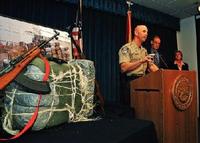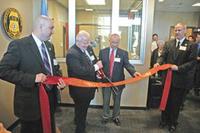-
Officials struggle to define border security
Despite not having a clearly defined conception of what security along the border should look like, the government has spent billions of dollars each year causing some to begin wondering what metrics can be used to define success for these various programs; as Congress battles to find cost savings and cut ineffective programs, it will become increasingly critical to have clear assessments of the efficacy of large expenditures like border security programs; Border Patrol is expected to begin trials with new metrics in October of this year and GAO indicates that these new metrics will help Border Patrol become more cost effective
-
-
Atlanta opposes tough immigration law fearing financial backlash
The Atlanta City Council is attempting to persuade Georgia governor Nathan Deal from signing a tough Arizona-style immigration law that was recently passed; the council’s opposition to the bill is largely based on financial reasons as it fears losing millions of dollars in revenue from its tourism and convention business if organizations boycott Georgia as a result of the law; similar financial reasons recently motivated the Arizona business community to mobilize against several controversial immigration bills; it is estimated that the backlash against the recent Arizona immigration law resulted in more than $200 million in lost revenues to businesses
-
-
Arizona sheriff accuses Border Patrol of suppressing arrest figures
A sheriff in Arizona has accused U.S. Border Patrol officials of instructing local law enforcement officers to stop arresting immigrants illegally entering the United States along its southern border; the sheriff says he had been instructed by federal officials to not arrest immigrants crossing illegally because they wanted to reduce figures for the number of apprehensions at the border; DHS Secretary Napolitano recently cited a reduction of apprehensions along the border as evidence that the border was more secure than ever; U.S. Border Patrol officials staunchly denied these claims
-
-
Space technology of practical uses on Earth

Terahertz technology developed for space missions to study the most distant objects in the universe is now finding a host of practical applications back on Earth; most clothing and packaging materials are transparent to Terahertz radiation, whereas skin, water, metal and a host of other interesting materials are not; this gives rise to some important day-to-day applications: detecting weapons concealed under clothing or inside parcels; distinguishing skin and breast cancer tissue; quality control of manufactures items and processes in factories
-
-
Smugglers use portable ramp to jump border fence

Drug smugglers along the U.S.-Mexico border are relying on increasingly more innovative ways to bypass additional security measures deployed along the southern border; law enforcement officials recently discovered a mobile folding ramp that allowed vehicles to drive over the border fence; the portable ramp was found in the Barry M. Goldwater Range east of Yuma, Arizona as Border Patrol agents chased a vehicle that had just used the ramp to leap over the fence with 1,000 pounds of marijuana
-
-
Pinal County U.S. No. 1 pass-through county for drugs, human smuggling

Sheriff Paul Babeu of Pinal County, Arizona says his county was the number one pass through county in the nation for drug and human smuggling; the amount of marijuana seized in Pinal County has increased from 19,619 pounds in 2008 to more than 45,000 pounds seized last year; “We need help out in Arizona. On anybody’s scorecard, if the majority of people [illegal immigrants] are getting through, that is a failing grade. Period,” Sheriff Paul Babeu the sheriff called for implementing in Pinal County the system now in place in the Yuma sector, where 96 percent of those attempting to cross illegally are captured
-
-
More mass graves unearthed in Mexico

The number of bodies found in mass graves in north-eastern Mexico over the past week has risen to 88, after 16 more corpses were discovered; the graves are the largest concentration ever found in one area in Mexico; a gang member who participated in the killing told police that most of the victims were travelling through the area on buses; the motive for the killings remains unclear; the graves resemble the discovery last August of the bodies of seventy-two Central and South American migrants, who were killed in the same town for refusing to join the ranks of the cartel which had abducted them
-
-
Federal court upholds ruling against Arizona immigration law

A federal appeals court ruled against the controversial Arizona immigration law stating that it was a violation of the constitution; the Ninth U.S. Circuit Court of Appeals upheld a stay blocking the implementation of significant portions of the Arizona immigration law stating that immigration enforcement was a federal responsibility and the Arizona law overstepped its bounds; last month five additional immigration bills failed to pass through the Arizona legislature including the highly controversial attempt to deny children of illegal immigrants birthright citizenship; experts believe that the bills failed largely as a result of the business community’s opposition
-
-
Sector Report for Thursday, 7 April 2011: Border / Immigration control
This report contains the following stories.
Plus 1 additional story.
-
-
A Jordanian solution for SBInet replacement?
After spending nearly $1 billion dollars and five years on the now defunct virtual border fence project known as SBInet, DHS is still actively seeking to build a high tech virtual border along the southern border; this time, DHS is determined to purchase technology that meets performance standards and is delivered on time and at cost; DHS hopes to invest an additional $750 million to purchase mature sensor and surveillance technology; to ensure the project’s success, DHS is exploring off the shelf projects that can “plug and play” with hardware and software from other suppliers; contracts will be terminated if they are delivered late, fail to meet performance standards, or are over initial costs projections
-
-
U.S. gets more deeply involved in Mexican drug war
As the war against Mexico’s deadly drug cartels rages on, American law enforcement agents are getting more deeply involved than ever before; the United States has primarily provided intelligence and training, while Mexican forces perform kinetic operations; despite these closely coordinated efforts to battle the drug cartels, U.S involvement has created friction on both sides of the border; Mexican officials downplay the presence of U.S. agents and their scope of responsibility fearing public backlash; critics in the United States fear that the violence is spilling over; the stepped up policing efforts have led to mixed results
-
-
How many people from terrorism-sponsoring states enter the U.S. illegally?
Senator John Cornyn (R-Texas) says the United States arrested people from nations designated as terrorism sponsors on the border with Mexico in the first nineteen months of Obama administration; an Austin newspaper investigated this claim and reached these conclusions: Cornyn is right that there were arrests of people from the four states designated by the United States as sponsoring terrorism (Cuba, Iran, Sudan, and Syria) — but: the number of people from these states arrested on the Mexican border is miniscule (0.02 percent of the 540,865 total arrests on the southwestern border in fiscal 2009); 87 percent of the people from these countries arrested while trying to enter the United States illegally do so through the Canadian border; and the numbers are dropping: there were 3,309 apprehensions of people from terrorism-sponsoring countries in 2005 (when Libya and North Korea were also on the list), 935 apprehensions in 2009, and 736 in fiscal 2010
-
-
New joint U.S. - Canada border surveillance post opened in Michigan
Last month a sophisticated new surveillance center was opened in northern Michigan to monitor the U.S.- Canada border; the $30 million, 9,000 square foot facility, located at the Selfridge Air National Guard Base, will act as a joint command center for Custom and Border Protection, the FBI, Coast Guard, state and local law enforcement officials, and even Canadian police; the command center will receive real time feeds from eleven surveillance cameras installed on towers alongside the St. Clair River; agents at the new surveillance center will be keeping an eye on drug smuggling, human trafficking, and illegal crossings related to terrorist activity
-
-
Making better decisions on border security
Researchers developed a high-fidelity simulation and analysis program that aids policy and decision-makers tasked with making key procurements and funding choices; the program is a gaming platform originally designed to prepare decision-makers and first responders for weapons of mass destruction/weapons of mass effect (WMD/WME) attacks in metropolitan areas
-
-
ICE opens office in northern Michigan

The U.S. Immigration and Enforcement agency (ICE) recently opened a permanent facility in northern Michigan; the new ICE office will provide work space for agents conducting enforcement removal operations (ERO) and homeland security investigations (HSI); the 10,000 square-foot facility will include an evidence-processing room, modern offices, and a short-term holding cell; the facility will help ICE agents secure America’s northern border;a recent Government Accountability Report found that only thirty-two miles of the nearly 4,000 mile long northern border had “an acceptable level of security”
-
- All
- Regional
- Water
- Biometrics
- Borders/Immig
- Business
- Cybersecurity
- Detection
- Disasters
- Government
- Infrastructure
- International
- Public health
- Public Safety
- Communication interoperabillity
- Emergency services
- Emergency medical services
- Fire
- First response
- IEDs
- Law Enforcement
- Law Enforcement Technology
- Military technology
- Nonlethal weapons
- Nuclear weapons
- Personal protection equipment
- Police
- Notification /alert systems
- Situational awareness
- Weapons systems
- Sci-Tech
- Sector Reports
- Surveillance
- Transportation
Advertising & Marketing: advertise@newswirepubs.com
Editorial: editor@newswirepubs.com
General: info@newswirepubs.com
2010-2011 © News Wire Publications, LLC News Wire Publications, LLC
220 Old Country Road | Suite 200 | Mineola | New York | 11501
Permissions and Policies
Editorial: editor@newswirepubs.com
General: info@newswirepubs.com
2010-2011 © News Wire Publications, LLC News Wire Publications, LLC
220 Old Country Road | Suite 200 | Mineola | New York | 11501
Permissions and Policies
